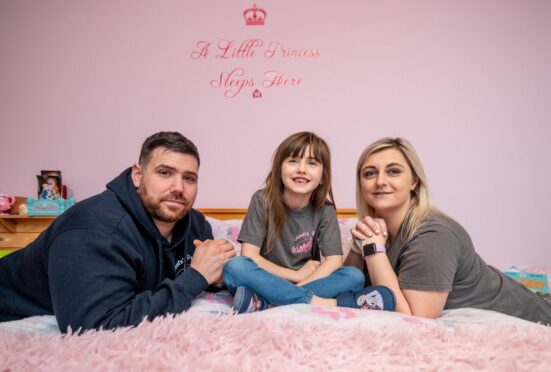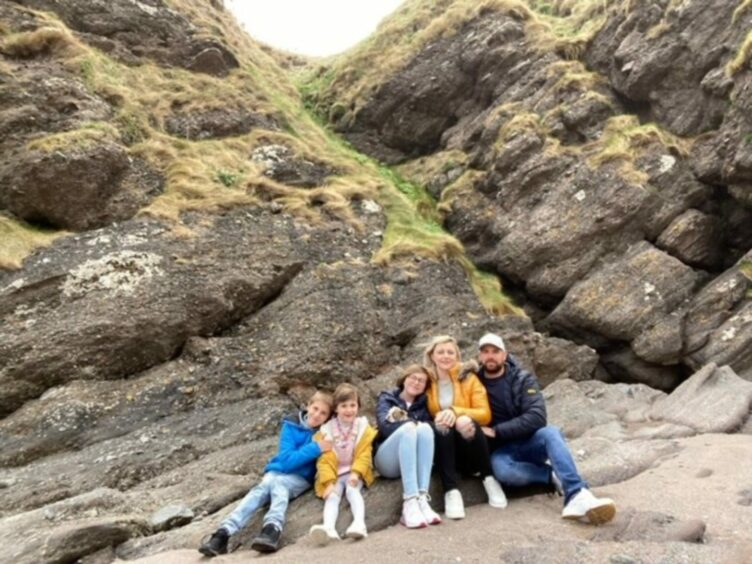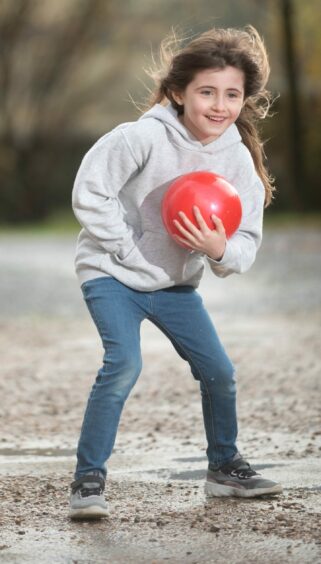Little Abbie Cresswell’s parents sing to her every night – in the hope the five-year-old never forgets them.
The brave youngster is like any other happy-go-lucky child who loves to dance and sing along to her favourite songs.
But Abbie has type three juvenile Batten disease, a rare genetic condition which causes dementia and with no known cure, she will be lucky to reach the age of 20.
Earlier this year, Abbie’s mum Danielle spoke of her heartbreak about her daughter’s condition as she appealed to people to back their fundraiser to take her to Disney World in Florida when she can still enjoy it.
The princess-mad youngster’s dream is about to come true, as more than £22,500 has been raised – more than enough for the trip, with the leftover used to buy sensory toys and equipment for Abbie when needed.
Mum Danielle and dad Ben are determined to do what they can to help their daughter remember them, and siblings Kacey, 13, and Scott, 11.
Her disease has already begun to destroy her sight and in “weeks, months or years” will rob her of her ability to walk, talk and feed herself.
Mrs Cresswell, 30, said: “It’s really hard to watch her everyday knowing what’s going to happen.
“You wouldn’t know to look at her – she still plays with her friends, loves playing with her Barbies and babies and goes to street dance every Friday.
“It’s horrible that there is something this cruel that will take everything away from her. The only thing this disease doesn’t take away from you is your hearing.”
‘We sing the same song every night’
So, in a loving bid to ensure their daughter never forgets them, Mr and Mrs Cresswell sing Dancing In The Sky, released in 2016 by Canadian singers Dani and Lizzi, to Abbie every night in the hope she can retain the memory.
Mrs Cresswell, from Inverboyndie, near Banff, said: “Hopefully by drumming it in she will always remember the song and know who we are when we come up the stairs singing it.
“We sing the same song every night and she knows all the words. We have the same song for me and her dad so, when the time comes, she will still know it’s mum or dad who’s speaking to her.”
“The other day I felt like I had been kicked in the stomach when she said, ‘when I don’t have my eyes any more, I won’t see where you are. I just thought, ‘Oh my God’ and I said ‘you will always know where I am, Mummy will never leave you, it’s you and me forever. And she said, ‘Yeah, me and you forever’. That was hard.”
Danielle Cresswell.
Abbie’s grandmothers also have songs to help Abbie remember them – You Are My Sunshine and A Night to Remember.
Juvenile Batten Disease is a neurodegenerative disorder so rare fewer than four children are diagnosed with it every year in the UK.
She was diagnosed after a teacher noticed she was struggling to see in class.
After numerous tests and scans, doctors broke the news she had the condition, which affects just 14,000 people worldwide – which “tore their lives apart”.
There are 14 different types of the fatal condition and last year the Scottish Government approved the use of a drug that can help slow the progression of those with the infantile CNL2 variant.
But Mrs Cresswell, a carer, said: “Abbie has CNL3 and the only treatment available costs $1.7million in America.
“How does anyone raise that kind of money? I sometimes think I can understand because it’s so rare but then I think, why don’t we try something here if it could save someone so young?”
But she stressed: “We’ll never give up hope. I just hope Abbie doesn’t progress too quickly, so if something does come out, it will be able to help her.”
Looking to the future
Abbie – who has recently had her first visit from the tooth fairy – is looking forward to Christmas and has asked Santa for a “hamster, a pink fish and 50 bath bombs.”
At school she is learning to read braille, use a cane and listen to where sounds are coming from to prepare her for when she is blind.
She also has a special computer with a magnifier at home to enable her to see the screen, and she plays kick-about with her friends using a football that has a bell in the centre.
The family is preparing to move out of their home next year while it is renovated with a lift and beams to support hoists for when Abbie needs them.
Mrs Cresswell admitted that despite the “cheeky monkey” still enjoying playing with her friends, there were some difficult moments.
“The other day I felt like I had been kicked in the stomach when she said, ‘when I don’t have my eyes any more, I won’t see where you are,” she said. “I just thought, ‘Oh my God’ and I said ‘you will always know where I am, Mummy will never leave you, it’s you and me forever. And she said, ‘Yeah, me and you forever’. That was hard.”
Doctors have reassured the couple that Kacey and Scott are not affected by the genetic condition, but have warned they could be carriers of the faulty gene.
Mr Cresswell, a plumber, added: “We just want to make as many happy memories as we can and give Abbie the life that she deserves.”
What is Batten disease?
Batten disease, also known as neuronal ceroid lipofuscinoses, is a rare and debilitating condition for which there is no cure.
There are several different types, which can determine the onset of symptoms, but all are fatal.
Abbie has juvenile Batten disease, which is picked up between the ages of four and seven.
It is caused when a child inherits two faulty copies of a gene, one from each parent, resulting in a build up of waste in the body’s cells causing blindness, loss of mobility and speech, seizures and dementia.
The only potential treatment Abbie’s know of for CLN3 costs more than £1.2million. It is a form of gene therapy, which aims to reverse symptoms with a stem cell transplant, and is only available in America.
Many children with Abbie’s condition live until their teenage years, but some can survive into their early 20s.


